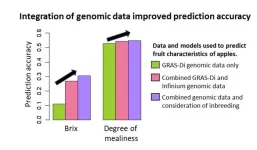(Press-News.org) COLUMBUS, Ohio – Why do employees sometimes accept working for an abusive boss?
A new study suggests that when a leader is seen as a high performer, employees are more likely to label abuse as just “tough love.”
Results showed that workers were less likely to show hostility to abusive bosses when the leader’s performance was high, and employees were even likely to think their career could be boosted by a successful – if abusive – boss.
The findings suggest that employees may be reluctant to call a successful boss abusive – even if the behavior warrants it, said Robert Lount, lead author of the study and professor of management and human resources at The Ohio State University’s Fisher College of Business.
“If employees see their boss as a successful leader, that seems to be incompatible with being abusive,” Lount said. “So they label the abuse as something more positive, like ‘tough love.’”
The study was published recently in the journal Organizational Behavior and Human Decision Processes.
The researchers conducted two studies. One involved a three-wave study of 576 workers in a variety of industries across the United States. Participants completed online surveys three times, each two weeks apart. They were asked about abusive behaviors by their boss, and how they would rate their leader’s overall effectiveness.
For those participants who reported abuse, other questions aimed to find if employees would label their boss as an abuser, or if they thought he or she was more of a “tough love” type of leader. In the survey, tough love bosses were described as “stern but caring,” “insensitive but nurturing” and “rough but well-meaning.”
The results showed that when employees rated their bosses as higher on use of abusive behavior – like using ridicule and saying an employee’s thoughts and feelings were stupid – the label they put on their supervisor depended somewhat on performance.
When they rated the boss as a high performer, workers were more likely to label their abusive boss as a “tough love” kind of supervisor. But when the boss’s performance was seen as lower, employees were more likely to give them the abuser label.
Why might abusive bosses be seen differently if they are successful?
Study co-author Bennett Tepper, also a professor of management and human resources at Ohio State, said employees may be looking for a silver lining of sorts.
“These bosses may treat employees harshly, but presumably their intent is to help their followers realize their potential – that’s the ‘tough love’ part,” Tepper said.
“And if the leaders have high performance, that suggests they are successful at bringing out the skills of their followers.”
Employees of abusive but successful bosses may not have liked the abuse – but they reported that they expected something good to come out of their bad situation. Findings showed these workers were more likely than others to think they would be promoted within their organization – presumably because of their experience working for a successful boss.
In addition, employees were less likely to lash out at abusive bosses who were high performers, by disobeying them or giving them the silent treatment.
A second study examined how the dynamic of working for an abusive and successful leader plays out in real time in a lab experiment.
In this case, 168 undergraduate students participated in a study in which they were told they were working in teams online led by an MBA student. Teams would compete against each other to solve a campus problem. (In actuality, there were no teams or leaders.)
Participants in the study read a message on their computer screen that was supposedly from their team leader, but was actually from the researchers. The researchers sent participants one of two messages – either abusive or not.
The abusive message supposedly from the MBA leader told the undergrads, “Don’t waste my time coming up with stupid ideas! Do better than a typical undergrad and don’t embarrass us!” The non-abusive message simply encouraged participants to “try hard.”
Participants developed ideas which were then supposedly assessed by their team leader and sent on to experts for evaluation. Later, all participants received one of two messages: one said that their team performed well above average compared to the other teams, according to the experts. The other said their team performed well below average.
Participants were then asked to evaluate their leader. And sure enough, participants who received the abusive message tended to give their leader a lower score on being abusive when their team was above average than when it was below average.
“We found that in a very short amount of time, you could quickly abate abusive labeling of a boss with high performance,” Lount said.
“Just finding out your team did better because of your leader’s judgment really dampened the willingness to label that person as abusive – even though your leader made the exact same statements as the other leaders who were called abusive after a below-average performance.”
Lount and Tepper emphasized that their study isn’t saying that abusive behavior can make some leaders successful. There is overwhelming evidence from years of research that abusive leadership is not good for employees or organizations, they said.
In fact, other research suggests that successful bosses known for their “tough love” approach might be even more successful if they used more accepted management techniques.
Instead, this study is about how employees respond to abusive supervision, according to the researchers.
“I think our data really speak to how followers react to leaders who are both abusive and successful. They’re hesitant to call them abusive. Employees think they can’t be abusive because they are successful,” Lount said.
The findings may also suggest why, even today, some abusive bosses can have long careers, Tepper said.
“The bosses who get away with abusive behavior may be those who somehow find a way to get high performance despite their behavior,” Tepper said.
“Their high performance insulates them from the consequences because even their employees say he’s just a ‘tough love’ kind of boss.”
Woohee Choi, who received her PhD from Ohio State and who is now an assistant professor at Providence College, was also a co-author of the study.
END
Why some abusive bosses get a pass from their employees
Workers may accept ‘tough love’ from successful leaders
2024-07-08
ELSE PRESS RELEASES FROM THIS DATE:
UNC researchers identify potential treatment for Angelman syndrome
2024-07-08
CHAPEL HILL, N.C. – Angelman syndrome is a rare genetic disorder caused by mutations in the maternally-inherited UBE3A gene and characterized by poor muscle control, limited speech, epilepsy, and intellectual disabilities. Though there isn't a cure for the condition, new research at the UNC School of Medicine is setting the stage for one.
Ben Philpot, PhD, the Kenan Distinguished Professor of Cell Biology and Physiology at the UNC School of Medicine and associate director of the UNC Neuroscience Center, and his lab have identified a small molecule that could be safe, non-invasively delivered, and capable of ...
Study: Weaker ocean circulation could enhance CO2 buildup in the atmosphere
2024-07-08
As climate change advances, the ocean’s overturning circulation is predicted to weaken substantially. With such a slowdown, scientists estimate the ocean will pull down less carbon dioxide from the atmosphere. However, a slower circulation should also dredge up less carbon from the deep ocean that would otherwise be released back into the atmosphere. On balance, the ocean should maintain its role in reducing carbon emissions from the atmosphere, if at a slower pace.
However, a new study by an MIT researcher finds that scientists may have to rethink the relationship between the ocean’s circulation and its ...
Brain size riddle solved as humans exceed evolution trend
2024-07-08
The largest animals do not have proportionally bigger brains - with humans bucking this trend - a new study published in Nature Ecology and Evolution has revealed.
Researchers at the University of Reading and Durham University collected an enormous dataset of brain and body sizes from around 1,500 species to clarify centuries of controversy surrounding brain size evolution.
Bigger brains relative to body size are linked to intelligence, sociality, and behavioural complexity – with humans having evolved exceptionally large brains. The new research, published today (Monday, 8 July), reveals the largest animals do not have proportionally bigger brains, ...
GeneMAP discovery platform will help define functions for ‘orphan’ metabolic proteins
2024-07-08
A multidisciplinary research team has developed a discovery platform to probe the function of genes involved in metabolism — the sum of all life-sustaining chemical reactions.
The investigators used the new platform, called GeneMAP (Gene-Metabolite Association Prediction), to identify a gene necessary for mitochondrial choline transport. The resource and derived findings were published July 8 in the journal Nature Genetics.
“We sought to gain insight into a fundamental question: ‘How does genetic variation determine our “chemical individuality” — the inherited differences that make us biochemically unique?” said Eric Gamazon, ...
Zero-emissions trucks alone won't cut it: Early retirement of polluters key to California's emission goals
2024-07-08
California must implement early retirement for existing heavy-duty vehicles as well as introducing zero-emissions vehicles (ZEVs) to protect Black, Latino and vulnerable communities and hit net zero greenhouse gas (GHG) emissions targets by 2045. This is the outcome of a new study published in Environmental Research: Infrastructure and Sustainability by researchers from Stanford University and Arizona State University.
Stringent policies for mandating both ZEVs and early vehicle retirement could reduce cumulative emissions by two-thirds (64%) and reduce half of pollution-related mortality, particularly among disadvantaged communities.
California is the world’s 5th largest ...
Hexagonal perovskite oxides: Electrolytes for next-generation protonic ceramic fuel cells
2024-07-08
This study presents a significant advancement in fuel cell technology. Researchers from Tokyo Tech identified hexagonal perovskite-related Ba5R2Al2SnO13 oxides (R = rare earth metal) as materials with exceptionally high proton conductivity and thermal stability. Their unique crystal structure and large number of oxygen vacancies enable full hydration and high proton diffusion, making these materials ideal candidates as electrolytes for next-generation protonic ceramic fuel cells that can operate at intermediate temperatures without degradation.
Fuel cells offer a promising solution for clean energy by combining hydrogen and oxygen to generate electricity, ...
Genomic data integration improves prediction accuracy of apple fruit traits!
2024-07-08
Over the past few decades, the world has witnessed tremendous progress in the tools used for genomic analysis. While it’s usually more common to associate these tools with the fields of biology and medicine, they have proven to be very valuable in agriculture as well. Using numerous DNA markers obtained from next-generation sequencing technologies, breeders can make genomic predictions and select promising individuals based on based on their predicted trait values.
Various systems and methodologies aimed at improving the ...
Visualizing short-lived intermediate compounds produced during chemical reactions
2024-07-08
Immobilizing small synthetic molecules inside protein crystals proves to be a promising avenue for studying intermediate compounds formed during chemical reactions, report scientists from Tokyo Tech. By integrating this method with time-resolved serial femtosecond crystallography, they successfully visualized reaction dynamics and rapid structural changes occurring within reaction centers immobilized inside protein crystals. This innovative strategy holds significant potential for the intelligent design of drugs, catalysts, and functional materials.
Most complex chemical reactions, whether synthetic or biological, do not involve ...
It’s time to rethink our attitude to fatness, academic argues
2024-07-08
Prejudice against fat people is endemic in our society and public health initiatives aimed at reducing obesity have only worsened the problem, according to a U.S. academic.
In her new book Why It’s OK To Be Fat, Rekha Nath, an Associate Professor of Philosophy at the University of Alabama, argues for a paradigm shift in how society approaches fatness.
According to Nath, society must stop approaching fatness as a trait to rid the population of, and instead fatness should be approached through the lens of social equality, attending to the systematic ways that society penalizes fat people for their body size.
Nath explains: “Being fat is seen as unattractive, as gross even. ...
Braiding community values with science is key to ecosystem restoration
2024-07-08
Up on the “roof of the world”, one of the world’s largest ecosystem restoration projects is taking place. The Qinghai-Tibetan Plateau (QTP) in western China is the world’s highest plateau and covers a land area roughly five times the size of France.
Home to thousands of rare plants and wildlife and the source of water for more than 2.5 billion people, this vital ecosystem is under threat.
The region’s grassland is degrading due to climate change and intense livestock grazing. Government ...
LAST 30 PRESS RELEASES:
A “smart fluid” you can reconfigure with temperature
New research suggests myopia is driven by how we use our eyes indoors
Scientists develop first-of-its-kind antibody to block Epstein Barr virus
With the right prompts, AI chatbots analyze big data accurately
Leisure-time physical activity and cancer mortality among cancer survivors
Chronic kidney disease severity and risk of cognitive impairment
Research highlights from the first Multidisciplinary Radiopharmaceutical Therapy Symposium
New guidelines from NCCN detail fundamental differences in cancer in children compared to adults
Four NYU faculty win Sloan Foundation research fellowships
Personal perception of body movement changes when using robotic prosthetics
Study shows brain responses to wildlife images can forecast online engagement — and could help conservation messaging
Extreme heat and drought at flowering could put future wheat harvests at risk
Harlequin ichthyosis: a comprehensive review of pathogenesis, diagnosis, and management
Smithsonian planetary scientists discover recent tectonic activity on the Moon
Government censorship of Chinese chatbots
Incorporating a robotic leg into one’s body image
Brain imaging reveals how wildlife photos open donor wallets
Wiley to expand Advanced Portfolio
Invisible battery parts finally seen with pioneering technique
Tropical forests generate rainfall worth billions, study finds
A yeast enzyme helps human cells overcome mitochondrial defects
Bacteria frozen in ancient underground ice cave found to be resistant against 10 modern antibiotics
Rhododendron-derived drugs now made by bacteria
Admissions for child maltreatment decreased during first phase of COVID-19 pandemic, but ICU admissions increased later
Power in motion: transforming energy harvesting with gyroscopes
Ketamine high NOT related to treatment success for people with alcohol problems, study finds
1 in 6 Medicare beneficiaries depend on telehealth for key medical care
Maps can encourage home radon testing in the right settings
Exploring the link between hearing loss and cognitive decline
Machine learning tool can predict serious transplant complications months earlier
[Press-News.org] Why some abusive bosses get a pass from their employeesWorkers may accept ‘tough love’ from successful leaders





